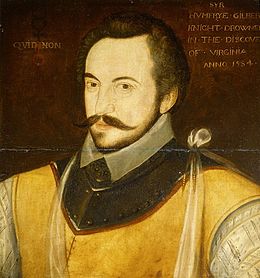Humphrey Gilbert
English explorer, politician and soldier (1539-1583)
Sir Humphrey Gilbert (c. 1539 – 9 September 1583) was an adventurer, explorer, member of parliament and soldier who served during the reign of Queen Elizabeth I and was a pioneer of the English colonial empire in North America and the Plantations of Ireland. He took Newfoundland for the crown in 1583, establishing a colony as St. John's. He was drowned on the journey home on 9 September 1583.

Quotes
edit- We are as near to heaven by sea as by land!
- Dying words as his frigate Squirrel sank in the Atlantic Ocean near the Azores, 5 August 1583, Quoted in Richard Hakluyt, The Third and Last Volume of the Voyages of the English Nation (1600). Chamber's Dictionary of Quotations (1996), p. 353
Quotes about Humphrey Gilbert
edit- The heddes of all those (of who sort soever thei were) which were killed in the daie, should be cutte off from their bodies and brought to the place where he incamped at night, and should there bee laied on the ground by eche side of the waie ledying into his owne tente so that none could come into his tente for any cause but commonly he muste passe through a lane of heddes which he used ad terrorem...[It brought] greate terrour to the people when thei sawe the heddes of their dedde fathers, brothers, children, kindsfolke, and freinds...
- Francis Jennings, The Invasion of America (New York: W. W. Norton, 1975), p. 168
- An interesting psychological case, with the symptoms of disturbed personality that often go with men of mark, not at all the simple Elizabethan seaman of Froude's Victorian view. He was passionate and impulsive, a nature liable to violence and cruelty – as came out in his savage repression of rebels in Ireland – but also intellectual and visionary, a questing and original mind, with the personal magnetism that went with it. People were apt to be both attracted and repelled by him, to follow his leadership and yet be mistrustful of him.
- A. L. Rowse, The Elizabethan Renaissance: The Life of the Society (1971), p. 160.
- The men of war could not be maintained without their churls and calliackes, old women and those women who milked their Creaghts (cows) and provided their victuals and other necessaries. So that the killing of them by the sword was the way to kill the men of war by famine.
- David B. Quinn, The Elizabethans and the Irish (Folger Shakespeare, 1966), p. 172
- Handsome, learned, headstrong and vain, the Elizabethan adventurer Humphrey Gilbert was a brutal English conquistador who sought to establish Ireland as an English colony, terrorizing men, women and children, sometimes creating a ghoulish pathway of bodyless heads to his own tent.
- Simon Sebag Montefiore, Monsters: History's Most Evil Men and Women (2009)
- In 1562 Gilbert gained his first experience of warfare, serving under the earl of Warwick at the siege of Le Havre. He served under his mentor Sidney in Ireland in 1565, and returned there in 1569 as governor of the province of Ulster. He went on to plan an extensive English colonial settlement around Baltimore, near Cork, in the southern province of Munster, as part of the Elizabethan policy of replacing the independent Irish feudal lords with ‘lord presidencies’, military governors loyal to Elizabeth, a policy accompanied by the confiscation of land from local clans.
- Simon Sebag Montefiore, Monsters: History's Most Evil Men and Women (2009)
- Gilbert’s actions provoked the outbreak, in June 1569, of the first of the Desmond rebellions, led by the Fitzgerald earls of Desmond, who controlled much of Munster. Sidney ordered Gilbert to pursue the rebel leader James Fitzmaurice Fitzgerald, a devout Catholic who resented the incursions of Elizabeth’s Protestant troops. Although Fitzgerald evaded capture by retreating into the hills and conducting a guerrilla war, Gilbert — now governor of Munster — pursued a policy of devastating the lands of the Desmonds. In December 1569 Sidney awarded Gilbert his knighthood, surrounded by the bloody corpses of his victims at an enemy camp that his troops had just decimated.
- Simon Sebag Montefiore, Monsters: History's Most Evil Men and Women (2009)
- Gilbert's campaign was utterly relentless, the main plank of his strategy being to spread such terror through the Irish people that they wilted in the face of his advancing troops. Thus, without having to rely on the artillery normally needed in siege warfare, Gilbert obtained the surrender of nearly forty castles in the Kerry area in just three weeks. Gilbert himself fought with great personal bravery, but the terror conducted by his forces was deliberate, systematic, gruesome and undertaken with relish — as in their practice of severing the heads of dead corpses and placing them neatly on the ground, their faces visible, to form a corridor leading to Gilbert's tent. Thus, when his enemies came to discuss the terms of their surrender, they were confronted with the decapitated heads of their ‘dead fathers, brothers, children, kinsfolk and friends’.
- Simon Sebag Montefiore, Monsters: History's Most Evil Men and Women (2009)
- In November 1578 Gilbert had made an attempt to sail to America, but was forced back by severe storms. He eventually established a colony in Newfoundland in June 1583, but drowned on the voyage home, when his ship went down in heavy seas. It was said that Gilbert had last been seen on deck reading Thomas More’s Utopia. But in the end Gilbert would not be remembered for his learning or his courage or his imagination, but for setting the brutal pattern of English colonial rule in Ireland.
- Simon Sebag Montefiore, Monsters: History's Most Evil Men and Women (2009)